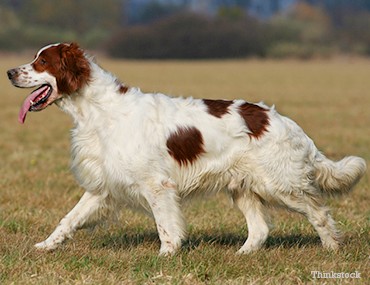Background
The Irish Red and White setter originated in Ireland during the 17th century, much earlier than the Irish Setter. They were bred to help bird hunters and were easy to see in the field due to their markings. They would find the location of the birds by sniffing the air then, when they got close, freeze in a standing position or crouch down and slowly creep forward.
In the 19th century the breed faced the brink of extinction but was revived in the 1920s due to the efforts of the Reverend Noble Huston. His work in gathering the red and whites that were available proved to be the catalyst that saved them.
The Irish Red and White Setter was recognized by the American Kennel Club in 2009.
Sizing up
- Weight: 50 to 75 lbs.
- Height: 22 to 26 inches
- Coat: Silky, medium to long in length
- Color: Primarily white with red patches
- Life expectancy: 11 to 15 years
What’s the Irish Red and White Setter like?
The Irish Red and White Setter is one of the most loving and devoted breeds out there which makes them an ideal family dog. They also make great watch dogs because they’re extremely alert. They’re a very high energy breed and enjoy running to get in plenty of daily exercise.
Training isn’t always the easiest because they can be very stubborn and headstrong. Begin training as soon as you bring the Red and White home. He’s highly intelligent and will pick up on things quickly.
The Irish Red and White Setter should be combed and brushed a couple times a week to remove any mats and keep the coat well groomed.
Health
The Irish Red and White Setter is a healthy breed but has several health concerns to watch for:
- Hip dysplasia
- Cataracts
- Progressive retinal atrophy
- Hypothyroidism
- Canine Leukocyte Adhesion Deficiency (an immune disorder)
- Von Willebrand’s Disease
Takeaway Points
- The Irish Red and White Setter is an ideal addition to all types of families.
- The Irish Red and White Setter loves to run fast and over long distances so you might want to have a fenced in yard where he can run freely.
- The Irish Red and White Setter would make a great companion for someone who loves the outdoors.
If you have any questions or concerns, you should always visit or call your veterinarian -- they are your best resource to ensure the health and well-being of your pets.
